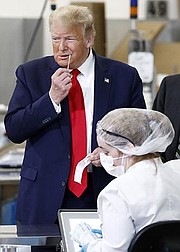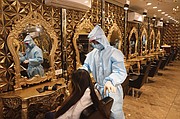GUILFORD, Maine -- President Donald Trump on Friday criticized Maine's Democratic governor for not moving quickly enough to reopen the state's economy and urged his supporters to help him win the state in November if they want to see the country rebound from the coronavirus shutdown.
Meanwhile, the World Health Organization is broadening its recommendations for the use of masks during the pandemic and Europe hopes to get its free travel zone up and running again by the end of this month.
Trump spoke in the small town of Guilford, home to Puritan Medical Products, one of only two major companies producing a special type of swab needed to ramp up coronavirus testing.
At stops in Guilford and Bangor, Trump's first visit to Maine as president, he took jabs at Gov. Janet Mills for not reopening businesses more quickly. Trump won one of Maine's three electoral votes in 2016.
[CORONAVIRUS: Click here for our complete coverage » arkansasonline.com/coronavirus]
"When are you going to open the state up?" Trump demanded as he spoke at the medical supply company. "What's she doing?"
Earlier in Bangor, Trump compared Mills to a "dictator" and said she was preventing her state from reaping money from Maine's usually busy summer tourist season.
"She's going to destroy your state," he said. "I'm not a fan."
Mills responded with a lengthy rebuttal.
"Yesterday, I asked the president to check his rhetoric at the door and to lead us with courage and compassion through this difficult time," she said. "Sadly, but unsurprisingly, he continues to prove himself incapable of doing so."
[Video not showing up above? Click here to watch » https://www.youtube.com/watch?v=L5QuH2qUJ3g]
"What Maine people heard today was more of the same incendiary rhetoric and insults he uses to try to divide us and to stoke tension and fear. What Maine people heard today was largely devoid of fact and absent of reality. What Maine people saw today was a rambling, confusing, thinly veiled political rally."
She rebuffed Trump's claim that Maine remained shuttered by the virus, saying 13 of the state's 16 counties have been reopened and that Maine was the first in New England to allow indoor dining at restaurants.
Ahead of Trump's visit, Mills had urged him to cancel the trip because of security concerns given the civil unrest over the death of George Floyd.
During Trump's call with governors this week, Mills criticized him for urging governors to "dominate" protesters and toss perpetrators of violence in prison and for his administration's move to clear out peaceful protesters near the White House so the president could walk to a nearby church.
TRUMP CHEERED, JEERED
Trump's caravan rolled through Guilford, drawing cheers from supporters and boos from detractors. The crowd alternated between "Black Lives Matter!" and "We Love Trump!" chants as his limousine approached. There was some shouting back and forth among the factions, but the crowd was peaceful. Trump did not refer to Floyd or the protests during his stops in the state.
Supporters outnumbered anti-Trump demonstrators in Guilford. But there were numerous other demonstrations around the state, and some organizers had dissuaded protesters from going to Guilford.
The official White House event showcased the fact that his administration is providing $75.5 million through the Defense Production Act for Puritan to double production to 40 million swabs a month, and the company plans to open a second production site by July 1.
More than 350 workers in Guilford have been working long hours since the pandemic began.
"We're doing our best to supply the needs. It's critical that our country is taken care of," co-owner Timothy Templet said.
Trump began his visit in Bangor, where he met commercial fishermen and signed an order to reopen fishing waters that were closed in 2016 when the Obama administration designated the first and only national marine monument in the Atlantic Ocean.
The president also used the visit to warn the European Union and China that if tariffs aren't cut on Maine lobsters, they'll face retaliatory tariffs equal to or higher than those hurting the state's fishermen.
SEN. COLLINS STAYS AWAY
The president made his trip to Maine despite not only Mills' plea to stay home but concerns from Republicans that his visit could hurt GOP Sen. Susan Collins' reelection bid.
Republicans have said Collins has sought to keep her distance from Trump as she faces an uphill struggle for a fifth term -- a crucial race for the party to keep its narrow Senate majority. Colin Reed, a GOP strategist, said Collins would have to "outrun" Trump in Maine if she hopes to win again, and a presidential visit isn't something her campaign would request.
"If he goes to these blue, purple and battleground states, it's going to create headaches for the Republican incumbents running for reelection who not only have to deal with the shaky national tide, but then have to deal with his presence in the state and everything that goes with it," Reed said.
Collins planned to work in Washington on Friday rather than join Trump in her home state, said her spokeswoman, Annie Clark.
The Senate race in Maine is considered a toss-up by the nonpartisan Cook Political Report.
The senator said this week it was "painful to watch" as federal officers cleared protesters from Lafayette Square near the White House.
"It is at times like this that a president needs to speak to the nation, to pledge to right wrongs, and to calm inflamed passions. I hope that the president will advance that effort wherever he goes, including on his visit to Maine," Collins said in a statement Thursday.
WIDER USE OF MASKS URGED
In other news, WHO is now advising that in areas where the virus is spreading, people should wear fabric masks when social distancing is not possible, such as on public transportation and in shops.
WHO Director-General Tedros Adhanom Ghebreyesus said people older thane 60 or with underlying medical conditions also should wear masks in situations where social distancing cannot be maintained. WHO previously had recommended that only health care workers, people with covid-19 and their caregivers wear medical masks, noting a global shortage of supplies.
During a press briefing discussing the revised guidance, Tedros added that "masks on their own will not protect you from covid-19" and emphasized the importance of hand-washing, social distancing and other infection-prevention strategies.
WHO also widened its mask guidance to specify that health workers in areas where the virus is spreading freely should always wear masks in medical facilities. Doctors working in cardiology or other wards, for example, should wear medical masks even if the facilities have no known coronavirus patients, Tedros said.
Maria Van Kerkhove, WHO's technical lead on covid-19, said the updated recommendations were based on new research commissioned by the U.N. health agency.
April Baller, a WHO infection control expert, said the type of masks recommended for the general public are fabric or cloth coverings that can be made at home. She said part of the reason for the widening of WHO's advice on masks was the increasing evidence that covid-19 can be spread by people before they have symptoms.
WHO previously said that transmission from people who do not have symptoms was not believed to be a major driver of the virus pandemic.
"What [the masks] do is they prevent a person who may actually have the disease from transmitting it to somebody else," Baller said.
EUROPE TRAVEL A JUMBLE
Europe could have its free travel zone up and running again by the end of this month, but travelers from farther afield will not be allowed in before July, a European Union commissioner said Friday after talks among the bloc's interior ministers.
Panicked by Italy's coronavirus outbreak in February, countries in the 26-nation Schengen travel zone -- where people and goods move freely without border checks -- imposed restrictions without consulting their neighbors to try to keep the disease out. The moves caused border traffic jams and blocked medical equipment.
All but essential travel into Europe from the outside is restricted until June 15, but many ministers suggested Friday that they want this deadline extended until early July.
The meeting came as the Czech Republic was easing restrictions with some of its neighbors -- Austria, Germany and Hungary.
Also Friday, Switzerland said it plans to lift restrictions on travel from EU nations and Britain on June 15. Switzerland is not an EU member but is part of the Schengen travel zone.
German Interior Minister Horst Seehofer, whose country plans to lift its remaining border checks June 15 like many other EU countries, said "the internal border controls will be over in all of Europe at the end of June."
But the perception that Italy is still dangerous is weighing heavily on its tourism sector.
In an apparent reference to Austria and Greece, which have not fully opened to Italian tourists, Italian Foreign Minister Luigi Di Maio denounced the "ad hoc" measures put in place by some countries as "a violation of the European spirit that has always distinguished us."
Di Maio said Rome would provide regular infection data to Austria "so they can have certainty about Italy's numbers." Last week, he said Italy refused to be treated as a leper after Greece announced a list of 29 countries whose citizens could visit without testing or quarantine requirements, but excluded Italians, Britons and residents of other hard-hit countries.
Spanish Prime Minister Pedro Sanchez and Italian Premier Giuseppe Conte have sent a letter to European Commission President Ursula Von der Leyen urging "the lifting of restrictions at our internal borders [...] in a coordinated, non-discriminatory manner." The letter was shared with media in Spain on Friday.
Spain plans to wait until July 1 to drop its 14-day quarantine requirement for everyone who crosses its borders, Spaniards included.
Germany's Seehofer said most of the EU's interior ministers want to extend the current entry ban on outside travelers "by 14 days until July 1."
Visitors from the United States, Russia or Brazil, for example, would only be allowed back into Europe based on how those nations have brought the spread of the virus under control, he said.
Those three nations account for 44% of the world's confirmed infections and nearly 38% of the world's confirmed coronavirus deaths, according to Johns Hopkins.
Information for this article was contributed by Jill Colvin, Patrick Whittle, David Sharp, Maria Cheng, Lorne Cook, Karel Janicek, Geir Moulson, Nicole Winfield and Joseph Wilson of The Associated Press; and by Jordan Fabian of Bloomberg News.
A Section on 06/06/2020


